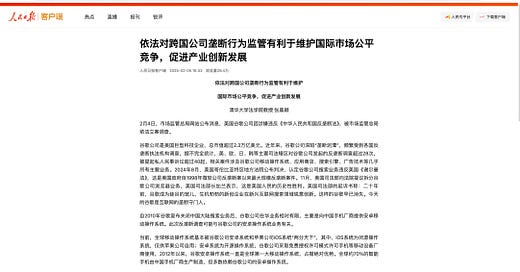China Signals Rationale Behind Its Antitrust Probe into Google and Sanctions Against PVH and Illumina
In China, after the government announces certain policies or measures, it often enlists experts and scholars closely associated with them to release comments. This serves as an indirect way to communicate the rationale behind these policies or to hint at information that may not be convenient for the authorities to state explicitly.
Yesterday, China's State Administration for Market Regulation (SAMR) announced the launch of an antitrust investigation into Google. However, the official statement was brief, consisting of only one sentence and lacking specific details on the grounds for the investigation. Similarly, China provided little explanation for adding PVH and Illumina to the Unreliable Entity List.
Today, Zhang Chenying, Director of the Competition Law Research Center at Tsinghua University Law School, published an article in People’s Daily, China’s top official media outlet, titled "Regulating the Monopolistic Behavior of Multinational Corporations in Accordance with the Law Helps Maintain Fair Competition in International Markets and Promote Industrial Innovation and Development."
In the article, Zhang explicitly stated that China’s antitrust regulator launched the investigation into Google because its Android operating system operates under a “pseudo-open-source but truly monopolistic” model. She accused Google of leveraging its market dominance to impose various technical and commercial restrictions on Chinese smartphone manufacturers. Specifically, Zhang highlighted that Google has signed agreements with software and hardware manufacturers as well as overseas telecom operators to enforce anti-fragmentation obligations, severely restricting the development of Android forks. Additionally, Google requires pre-installation of its entire suite of applications, further tightening its grip on the market.
Zhang emphasized that China’s antitrust enforcement against Google is legally justified under Article 2 of China’s Anti-Monopoly Law. She also noted that the investigation does not conflict with similar antitrust actions in other major jurisdictions and aligns with the principle of international comity and globally recognized antitrust standards.
Furthermore, Zhang argued that China’s mobile communications industry possesses strong production capabilities, a vast market, and extensive application scenarios, providing favorable conditions for the development of a new mobile operating system and a more dynamic commercial ecosystem. Drawing on the EU’s regulatory experience, Zhang advocated for strengthened enforcement against multinational monopolies and urged Google to remove its unreasonable restrictions. She asserted that this would contribute to a fairer and more equitable global market, enable Chinese enterprises to compete more effectively on the international stage, and inject new momentum into industrial innovation and the global economy.
It is important to note that Zhang is one of China’s leading antitrust experts. She is a member of the Expert Advisory Group of the Anti-Monopoly Commission of the State Council, a Fulbright Visiting Scholar at Harvard Law School, and previously worked at the Treaty and Law Department of the Ministry of Commerce.
Meanwhile, another prominent legal expert, Liao Shiping, a professor at Beijing Normal University Law School, published a separate commentary in CCTV Finance on the inclusion of PVH and Illumina in the Unreliable Entity List. In his article, titled "Implementing the 'Unreliable Entity List Regulations' in Accordance with the Law to Firmly Safeguard National Interests," Liao explicitly stated that PVH was added to the list due to its discriminatory measures against Xinjiang-related products, while Illumina was reportedly using political donations to push the U.S. Congress to pass the 'BIOSECURE Act' in an effort to suppress Chinese competitors. Liao asserted that these actions have severely harmed China’s national security, economic interests, and the legitimate rights of Chinese enterprises.
Liao also stressed that the Unreliable Entity List is not merely symbolic but has serious enforcement power—“teeth that can bite.”(能够咬出血的牙齿) He warned that China’s listing measures do not simply end with designation; authorities continuously monitor the transactions of listed entities. Liao further cautioned that any attempts to circumvent sanctions through intermediary transactions or "white gloves" will be severely punished. He did not rule out the possibility that entities assisting in evading Chinese sanctions could also be directly added to the Unreliable Entity List in the future.
Liao is a well-known international law expert in China. He was formerly a member of the International Law Advisory Committee of the Chinese Ministry of Foreign Affairs and has represented the Chinese government in various bilateral and multilateral negotiations. He has also been involved in handling cases under the WTO dispute settlement mechanism and international investment arbitration.
Below are the full translations of the two articles:
Regulating the Monopolistic Behavior of Multinational Corporations in Accordance with the Law Helps Maintain Fair Competition in International Markets and Promote Industrial Innovation and Development
Professor Zhang Chenying, Tsinghua University Law School
On February 4, the website of the State Administration for Market Regulation (SAMR) announced that Google, an American company, has been placed under investigation for allegedly violating the Anti-Monopoly Law of the People's Republic of China.
Google is a major U.S. technology giant with a total market capitalization exceeding $2.3 trillion. In recent years, Google has been deeply embroiled in "monopoly troubles," frequently facing antitrust investigations from enforcement agencies worldwide. According to incomplete statistics, Google has been subject to more than 28 antitrust investigations initiated by major jurisdictions such as the United States, the European Union, Japan, and South Korea, and has faced over 40 private civil lawsuits. These cases cover nearly all of Google's core business areas, including its mobile operating system, app store, search engine, and advertising technology.
Keep reading with a 7-day free trial
Subscribe to Geopolitechs to keep reading this post and get 7 days of free access to the full post archives.




